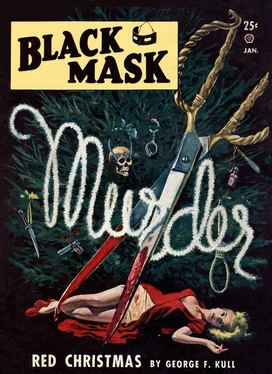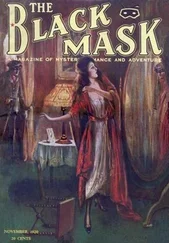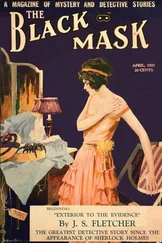Curtis Cluff - Black Mask Magazine (Vol. 31, No. 1 — January, 1948)
Здесь есть возможность читать онлайн «Curtis Cluff - Black Mask Magazine (Vol. 31, No. 1 — January, 1948)» весь текст электронной книги совершенно бесплатно (целиком полную версию без сокращений). В некоторых случаях можно слушать аудио, скачать через торрент в формате fb2 и присутствует краткое содержание. Город: New York, Год выпуска: 1948, Издательство: Fictioneers / Popular Publications, Жанр: Детектив, на английском языке. Описание произведения, (предисловие) а так же отзывы посетителей доступны на портале библиотеки ЛибКат.
- Название:Black Mask Magazine (Vol. 31, No. 1 — January, 1948)
- Автор:
- Издательство:Fictioneers / Popular Publications
- Жанр:
- Год:1948
- Город:New York
- ISBN:нет данных
- Рейтинг книги:3 / 5. Голосов: 1
-
Избранное:Добавить в избранное
- Отзывы:
-
Ваша оценка:
- 60
- 1
- 2
- 3
- 4
- 5
Black Mask Magazine (Vol. 31, No. 1 — January, 1948): краткое содержание, описание и аннотация
Предлагаем к чтению аннотацию, описание, краткое содержание или предисловие (зависит от того, что написал сам автор книги «Black Mask Magazine (Vol. 31, No. 1 — January, 1948)»). Если вы не нашли необходимую информацию о книге — напишите в комментариях, мы постараемся отыскать её.
Black Mask Magazine (Vol. 31, No. 1 — January, 1948) — читать онлайн бесплатно полную книгу (весь текст) целиком
Ниже представлен текст книги, разбитый по страницам. Система сохранения места последней прочитанной страницы, позволяет с удобством читать онлайн бесплатно книгу «Black Mask Magazine (Vol. 31, No. 1 — January, 1948)», без необходимости каждый раз заново искать на чём Вы остановились. Поставьте закладку, и сможете в любой момент перейти на страницу, на которой закончили чтение.
Интервал:
Закладка:
Both Jennifer Norris and William Kahalawai had made the front page. Jennifer’s story was complete in five paragraphs, three of which told what a great guy Allan Norris was. The other two gave little information other than the fact that she had attended Sarah Lawrence in the East, was thirty-one and her death was very sudden. There was no mention of guns or suicide or murder. Allan Norris had taken care of that. Kahalawai rated a two-column headline and three paragraphs at the bottom of the front page and a whole column continued on the sport page where there was a picture of him in football uniform. His athletic prowess was played up and no mention made of his scrapes with the law or of a box of heroin being found on his body. Death was described as due to an accidental fall and there was no hint of foul play. I was worried. The local gestapo was not dumb enough to think that he had fallen while picking wild flowers in the moonlight.
I looked up in time to see Anne Seccombe come out of the book store and strike out determinedly along King Street. She was agitated and she looked neither to the right nor to the left. I flipped a nickel on the counter and went out. At Richards Street, she turned to the right, walking rapidly. I stepped off the curb to cross and got caught by the traffic light. I stood in the swarm of pedestrians and watched her cut across Richards and hurry up the short walk to the post office arcade. The light changed and I moved fast.
She disappeared around the corner to the right. I moved after her and paused at the blind Hawaiian’s newsstand at the turn. The arcade ended a short way down and Anne was in line at the far stamp window. I moved into a knot of idlers of both sexes and examined the magazines on the rack. In a few minutes high heels clacked past my back. I waited for the sound to reach the entrance to the arcade, turned — and was in time to see it take place.
Anne swerved sharply toward the exit and bumped into a man who was just entering. Her pocketbook went spinning and the man went after it. He handed it back to her and raised his hat. She thanked him briefly and hurried out. He had handed her the purse with both hands and as he stepped away from her his right hand went into his pocket and her right hand went under the flap of her bag. The money and the merchandise had changed hands. I lost interest in her.
Chapter Four
Pali House
The man who had rescued her bag was the short, rodent-faced character who had been William Kahalawai’s companion last night. He took a newspaper from his pocket and pretended to scan it. He gave her time to round the corner of the Hawaiian Electric Company building, going back along King. Satisfied that no one was following her, his beady little eyes flicked over the loiterers in the arcade. I turned my back and tried to read my horoscope on a booklet in the newsstand.
When I looked around again, he had traversed the short length of sidewalk and was heading for the row of parked cars facing King Street. It was a happy accident that my coupe was in that line. Rat Face got into a 1947 station wagon and wheeled out into the King Street traffic. We turned left on Punchbowl and left again into Beretania. Soon we swung right toward the Nuuanu Pali and the windward side of the island. Once on the other side, we headed for the little town of Kaneohe, but Rat Face continued through the town and rapidly increased his speed as he left it behind.
Ten minutes later, he suddenly jammed on the brakes and turned off the road to the right. I lifted my foot from the gas but I was doing at least thirty-five when I slid past. I got a brief glimpse of a narrow overgrown trail winding between tall stands of kamani and eucalyptus trees. A hundred yards farther along another overgrown trail appeared. I parked in the bushes at the side of the trail, hurried back to the highway, took about three loping steps and did a slow double-take in the opposite direction.
Beginning inland, a low hill rose on a gradual incline toward the sea, sheered off abruptly at what I knew to be the water’s edge. At the very top of the cliff was a house, mostly of glass. It was this reflection that had caught my eyes. For whatever it was worth, I now knew the location of Walter Kent’s Pali House. I ran for the lane where the car had disappeared. There was no station wagon in view. I moved along the winding trail cautiously until it ended abruptly in a little clearing. The station wagon was parked in the center of the clearing, its dead motor still making tiny explosive snapping sounds from the heat. But Rat Face had disappeared.
A footpath led away from the clearing in the general direction of the ocean. I struck out through the underbrush at right angles to the path until I thought I was far enough away not to be heard, then swung parallel to the path and headed toward the ocean. I didn’t have far to go. The trees and underbrush ended abruptly in a short steep slope. At the foot of the slope the land flattened out into irrigated taro fields as far up and down the coast as I could see from my cramped position. The irrigated rows ran parallel to the coastline and the individual fields were separated from each other by wider irrigation ditches running at right angles to the rows. On the far side, a windbreak of bushes and stunted trees separated the fields from the brief, sandy beach and the ocean. Below me, two bent figures moved at a snail’s pace in mud and water up to their knees, between the luxuriant green rows of taro. I remembered from somewhere that the famous Hawaiian poi was made from the pounded roots of taro. It didn’t really seem to be worth all that effort.
I spotted the point where the trail path emerged into the fields. It led to the mounded bank of an irrigation ditch and proceeded along it in the direction of the ocean. Through the trees and bushes that made up the windbreak at the far end of the path I saw a small unpainted frame building. I guessed it to be an abandoned boathouse. Then I saw the third figure.
He was dressed like the others in straw hat, faded workshirt and dungarees, and he was standing motionlessly in the shade of the boathouse. He moved casually and the sunlight glinted on a metallic object in his hand. He was concentrating on the two figures in the field. He was an Oriental.
I looked back to the field. The two men had moved to a position opposite each other, working the same row. Something bothered me about the picture and I finally caught on to what it was. They had remained opposite each other much too long to be working, and yet, they couldn’t just be batting the breeze. If they were, it was the first time I had ever seen manual laborers anywhere remain in a cramped position to chat when they could be standing erect, giving their back muscles a rest. They moved apart and one of them worked back in the direction of the path. He moved faster now. When he reached the end of the row, his head bobbed up and he took a leisurely look around. He rose and made his way unhurriedly to the path and disappeared. But not before I had recognized his rat face in spite of the coolie get-up. It had been a smooth act. But I had learned how the dope changed hands.
The second man slowly worked his way back along the row, stepped onto the path and headed for the watcher at the boathouse. The two men spoke briefly and disappeared around the building.
My legs were beginning to protest against my heel-squatting position. I lowered myself to the ground and tried to massage some circulation back into them. Fifteen minutes went by and the pair didn’t reappear. I cursed the wind break that hid the narrow beach from my gaze. Farther down the beach, two husky Orientals in bathing trunks and carrying fishing spears, with goggles dangling from their necks, crossed a sandy spit going away from me. They would have had to pass the boathouse. I wondered if they had seen my field workers. Then it dawned on me. They were the two field workers! The windbreak had screened their departure and the difference of attire had almost fooled me. I could have kicked myself. I should have been able to tell that they were phony field workers when they were right under my nose. It was a small thing but it was the kind of mistake I get paid for not making. It was simply that their backs were too straight and they carried themselves with an arrogance that was not natural to the older and eternally weary field worker. I waited to be sure. Nobody appeared and I had the vast expanse all to myself.
Читать дальшеИнтервал:
Закладка:
Похожие книги на «Black Mask Magazine (Vol. 31, No. 1 — January, 1948)»
Представляем Вашему вниманию похожие книги на «Black Mask Magazine (Vol. 31, No. 1 — January, 1948)» списком для выбора. Мы отобрали схожую по названию и смыслу литературу в надежде предоставить читателям больше вариантов отыскать новые, интересные, ещё непрочитанные произведения.
Обсуждение, отзывы о книге «Black Mask Magazine (Vol. 31, No. 1 — January, 1948)» и просто собственные мнения читателей. Оставьте ваши комментарии, напишите, что Вы думаете о произведении, его смысле или главных героях. Укажите что конкретно понравилось, а что нет, и почему Вы так считаете.












